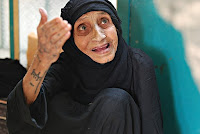 |
| Image Credit: By Staff Sgt. Michael Pryor (https://www.dvidshub.net/image/55817) [Public domain], via Wikimedia Commons |
What is frailty?
Why frailty happens and who are the people who become frail?
On average at least 10% of all older adults are frail and this percentage increases with advancing age.No old person will be disease-free, but not every old person becomes frail. Old age brings challenges for everybody but some are able to address this much better due to their support systems like family, social support and income and their larger life space* Those who have poor support systems and also those who reduce their life space are at higher risk of developing frailty than those who have good support systems and have a larger life space.When old age becomes an important concern?
You are as old as you feel! Age is an important factor and will catch up with everyone. But when you fall prey to diseases, restrict your mobility, and lose your support systems the frailty sets in and age becomes an important concern.How one can prevent transition to frailty?
Where do you find older adults with frailty?
Happy Ageing!
*Life space refers to the size of the area a person purposely moves through in his/her daily life, as well as the frequency of travel. A large life space means leaving the neighborhood more often.)
About the author: Dr. Naval Asija is a licensed MBBS Physician from India. MBBS is the equivalent of the MD degree offered by international medical schools. He is based in Delhi, India, and works as a medical writer, editor, and consultant. He supports medical researches as an author's editor, medical communication companies involved in medico-marketing activities, and medical technology companies in improving their products. He can be contacted via his LinkedIn Profile: https://www.linkedin.com/in/navalasija/
Disclaimer: The content provided here is NOT a substitute for professional medical advice. If you consider taking any action based on the above information, we recommend that it should be first confirmed with your doctor. Our detailed disclaimer statement can be read on our homepage.




Very informative .
ReplyDelete